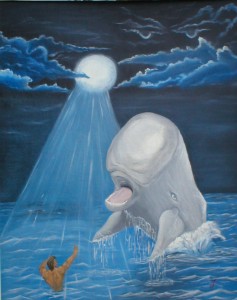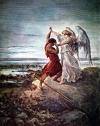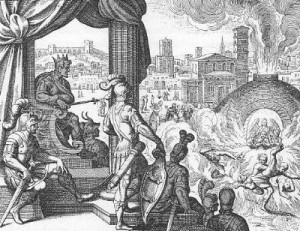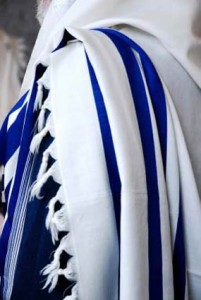Why, really, do we read Sefer Yonah on Yom Kippur?

(Based on ideas from a shiur heard at the 2007 YCT Yemei Iyyun by Aryeh Klapper. Audio can be downloaded at http://www.yctorah.org/component/option,com_docman/task,cat_view/gid,110/Itemid,13/ )
Why, really, do we read Sefer Yonah on Yom Kippur?
My instinctive answer to the question is that the city of Nineveh repents when threatened by God, and succeeds in averting His punishment. However, on reflection it seems there is something deeper. After all, we know next to nothing about Nineveh and what its sins were – in fact, the whole passage of the message to Nineveh and its repentance is only 6 verses long. In addition (as Tamar brought to my attention), some actually see the whole book as a satire – in most prophetic works, the prophet rails eloquently for pages and pages to get the people to repent, but to no avail, while Yonah utters 5 (in Hebrew) words (3:4) ‘Yet forty days, and Nineveh shall be overthrown.‘ , and the whole society reacts instantly. Perhaps the message of the book is also contained in its other three-plus chapters.
The structure of the book is of two narratives – Yonah fleeing from God, and Yonah carrying out God’s mission and his reaction – separated by the poetic prayer from within the fish. A few questions come to mind in the opening narrative:
- Why is God so intent on sending Yonah? If Yonah refuses his mission, is there no one else that God can call upon?
- The book tells us why Yonah refuses his mission – but oddly, only in the second narrative, not the first, where he actually refuses it. It would seem more logical to present Yonah’s objections in the context of his refusal to accept the mission.
- How are we to understand Yonah’s failure to pray for his life during the storm at sea (as everyone else on the boat is doing)?
- In 1:9, Yonah defines himself to the sailors as a Hebrew who fears God. He does not mention that he is fleeing from carrying out God’s mission – the text fills this in as an afterthought.
What’s happening is that Yonah has a beef with God – he doesn’t agree with the whole idea of the mission to Nineveh. His reasons are not important in the opening narrative – the point is, he assumes that if he disagrees with God, then he and God are finished, there is no more relationship. He is not escaping from God, he is abandoning God. This is why he does not pray with the others – he assumes that having disagreed with God, there can be no further conversation. I suppose that he assumes the only response from God will be to punish or kill him.
Yonah is swallowed by the fish, and remains there for 3 days. When he finally prays to God what would we expect him to say? “Thanks for sending the fish” – but this would have been appropriate on the first day! Or, “Get me out of the fish!” – but there is no mention of the fish. Any reference to drowning in his prayer, therefore, seems to refer to something other than physically drowning.
In general, by the way, when a Biblical poem interrupts a narrative, the purpose is never to advance the narrative, but to provide an insight into the perspective of a character. I imagine that it took Yonah three days to contemplate what was happening, and to finally conclude (2:5) “And I said: ‘I am cast out from before Thine eyes’; yet I will look again toward Thy holy temple.” If you read Yonah’s prayer, you will see that he is not simply thanking God for saving his life, but for inviting Yonah back into God’s presence – for inviting Yonah to continue the dialogue.
Now, in the second narrative, Yonah and God engage in this dialogue. Yonah now realizes that God has given him license to respond, and he says (4:2) “O LORD, was not this my saying, when I was yet in mine own country? Therefore I fled beforehand unto Tarshish; for I knew that Thou art a gracious God, and compassionate, long-suffering, and abundant in mercy, and repentest Thee of the evil. ”.
God responds with the parable of the gourd. God says, in effect, I’ll tell you what this is like – when you have nothing (Yonah before the shade of the gourd), and then you get something (Yonah enjoying the shade) and then you lose it again (Yonah after the gourd’s demise). If we extend this three-part parable to God’s situation, it doesn’t quite apply to Nineveh itself – after all, God Himself is the one who threatens to destroy Nineveh, rather than have its destruction intrude on Him – but it does apply to God’s relationship with Yonah. First God suffers, as it were, from loneliness; then he acquires a prophet, Yonah; then that relationship is abrogated by Yonah. Perhaps the point of the whole story is that Yonah erred in thinking that disagreeing with God necessitates severing the relationship – rather, God prefers to keep the conversation going. Yonah had believed that the relationship is predicated on obedience and submission – the book is about God correcting this idea.
R Levi Yitzchak of Berditchev told the story of a simple, hardworking Jew who was contemplating settling his accounts with God before Yom Kippur. “God,” he said, “I admit it – I have done some things I shouldn’t have. I short-changed some customers, I could have been more charitable, I didn’t set aside enough time for Torah and prayer…”
“But,” he continued, “You, God, are not so innocent either! What about my neighbor, whose life you took so suddenly at a young age, leaving a widow and four orphans? And what about the pogrom in the next district?,…”. He fell silent for a time, and then concluded, “I’ll tell you what, God – let’s call it even. I’ll forgive you, and you forgive me, and everyone will have a good year!”
I think this message is most relevant in our time, after the inexplicable suffering of the Holocaust, and when we are challenged to understand the Bible and our tradition in new ways. God wants to be challenged! Even if we disagree, God prefers that like Yonah in the second narrative, we stay and argue, rather than abandon Him to His loneliness.






